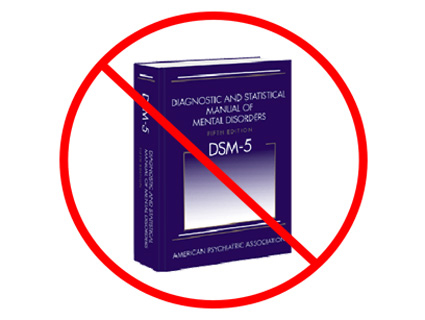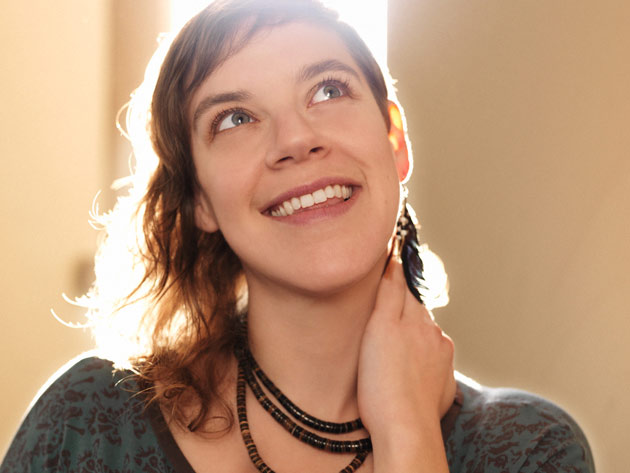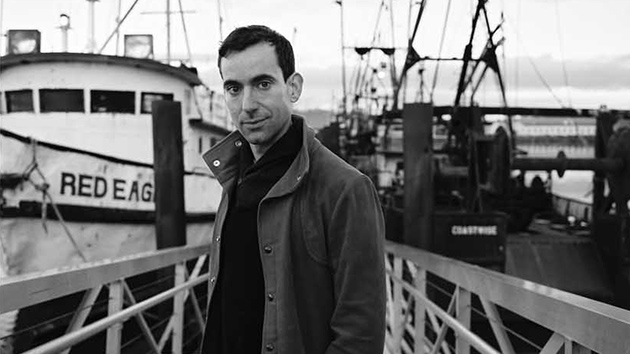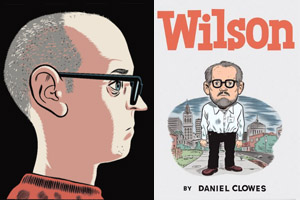To peruse Allie Brosh’s crudely drawn comics, one would never guess she is a perfectionist. But the lack of sophistication is deliberate. When she’s not caring for rescued rats or playing Magic: The Gathering—”I’m a huge dork”—the 28-year-old blogger can be found holed up in her room scrutinizing and refining her drawings, which largely consist of a stick figure in a shapeless bright pink dress making odd facial expressions. “They look really simple and sort of shitty, but it takes a few hours trying to get it right,” Brosh told me. “I don’t have any reference material for this creature that I’ve made to represent myself, aside from what’s in my head.”
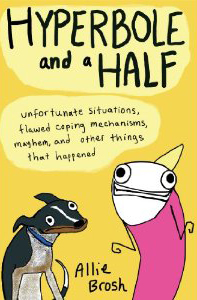
That creature is the star of Brosh’s new book, Hyperbole and a Half: Unfortunate Situations, Flawed Coping Mechanisms, Mayhem, and Other Things That Happened. Based on her popular comic blog, it chronicles her problem-child days (she once ate an entire cake intended for her grandfather’s birthday party), adventures with her dogs (one of which she suspects is mentally impaired), and musings on her character flaws. Procrastination, for instance—she actually started the blog as a way to avoid studying for a college physics final. “I sort of wondered if I could write something that people would like,” she says.
Four years, 383,000 Facebook likes, and some 72 million web visitors later, it’s clear that she could.

The book deal was a longtime dream: Brosh had resolved to become an author at age eight, filling three spiral-bound notebooks with a saga about a guy who fights various things. Her small-town upbringing—first in Auburn, California; later near Sandpoint, Idaho—gave her space to “be a little bit weirder” growing up. “I would get up at six o’clock in the morning and walk around the forest and try to find deer,” she says. “I was sort of a wild animal, forest child.”
Living in the sticks 10 miles from town, Brosh was forced to entertain herself. Her mom offered pens and rolls of butcher paper. “If things in the world actually looked like they did when I drew them, we would live in a terrifying place,” she jokes of her early creations.
Her childhood tales, such as the time she attended her friend’s birthday party heavily sedated, are among her most popular posts. But it was the darkly humorous accounts of her battles with severe depression that resonated most. “Trying to use willpower to overcome the apathetic sort of sadness that accompanies depression is like a person with no arms trying to punch themselves until their hands grow back,” she wrote.
After revealing details of her depression to readers in October 2011, Brosh went AWOL for a year and a half, re-emerging this past May to post a painfully honest chronicle of her downward spiral and contemplation of suicide. (It received 1.5 million visits in a single day.) She was surprised to learn that her fans—thousands weighed in with supportive comments—had worried about her so much during her absence. “When I’m really, really depressed, I just don’t find myself funny at all,” she explains. “It’s hard to know whether what I’m doing is something worth posting.”
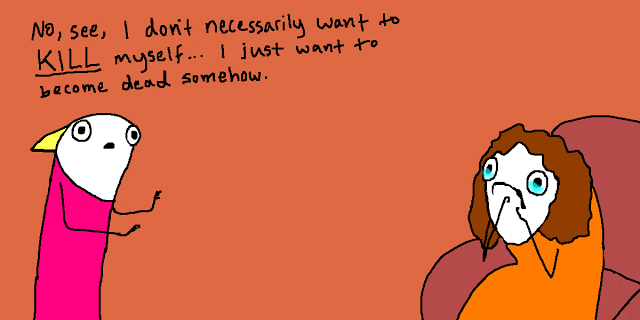
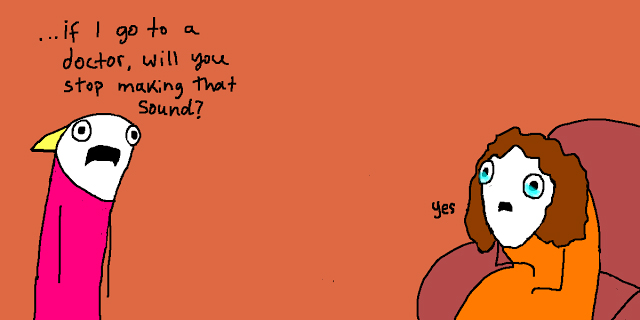
While she’s excited about the book, Brosh, who is hermitic to begin with, says the isolation of writing it left her sympathetic to Jack Nicholson’s character in The Shining. But “I sort of enjoyed the going crazy part,” she says. “I have nostalgic memories of those 18-hour days where I’m just drawing silly pictures and going absolutely insane.”
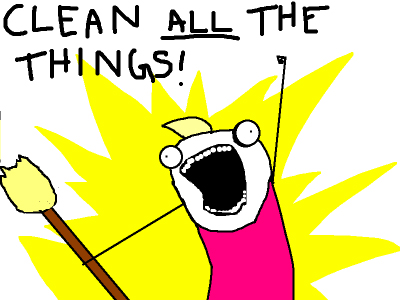

Mother Jones: Had you ever blogged before starting Hyperbole and a Half?
Allie Brosh: I had some silly thing on MySpace ages ago, but that’s about the extent of it. I was procrastinating on studying for a physics final and I wondered if I could write something that people would like. I’ve always enjoyed writing things, just as a means of entertaining myself. I have notebooks filled with stuff that I would write before, but I never showed it to anybody.
MJ: What was it like to switch from blogging to book writing?
AB: I spent long hours shut in my room with nothing but my own thoughts and thinking about trying to be funny, and you go a little bit insane. It’s sort of like The Shining. You don’t think of The Shining as a movie that you’d identify with, but I feel like I really identify with it now. To tell you the truth, I enjoyed the going crazy part. I don’t know if this is Stockholm Syndrome, but I have pleasant, nostalgic memories of those like 18 hours days where I’m just drawing silly pictures and going absolutely insane.
MJ: How long does it take you to write a post?
AB: It takes forever sometimes. I have a really specific image in my head of what I want the post to read like and what I want it to feel like. It’s sort of like trying to look at something out of your peripheral vision. I can sense the general shapes of what this needs to be and I know exactly when it’s wrong, but not when it’s right. Sometimes I’ve delayed posts for years because of this, because I haven’t found quite the right tone—or maybe I don’t even have the skill set yet to do it in the proper way.
MJ: Did you keep a diary or a journal when you were younger?
AB: When I was eight, I decided that I wanted to write a book. And this is something I was very heavily committed to at the time. I had every intention of getting it published, of course. I filled several spiral bound notebooks. It was just a story about a guy fighting different things. It was a total monstrosity, just rambling characters would come and go for no reason. I started drawing long before that, probably ever since I could pick up a pen and figure out what to do with it. My mom would use drawing as a babysitting tool; she would buy me rolls of butcher paper and just give me pens and tell me to go nuts. It was a good outlet for my energy. I was a problematic child.
MJ: From your posts, it seems like you grew up in a really isolated place.
AB: My family and I moved to Sandpoint, Idaho, when I was eight. It just allowed me to be a little bit weirder. If I wanted to entertain myself, I couldn’t just walk over to my neighbor’s house or to my friend’s house, so it led to me being more resourceful with my entertainment. I think that I was sort of a wild animal, forest child. I would get up at like six o’clock in the morning and just go like walk around in the forest and try to find deer.
MJ: What were your early drawings like?
AB: If things in the world actually looked like they did when I drew them, we would live in a terrifying place. I would draw people, but I didn’t understand how many appendages they were supposed to have, and I didn’t ever draw bodies, I would just sort of draw a circle and then place what were supposed to be facial features. I don’t know what was happening in my brain; I would see a person and something would flip it around in my brain and be like, “Hey, this is what they’re supposed to look like.” And I remember at the time thinking like, “Oh! This is really good.”
MJ: Did you stay interested in art as you got older?
AB: Oh yeah, I used to enter art competitions when I was in like seventh and eighth grade.
MJ: What would you draw?
AB: Wolves mostly. I drew a lot of wolves and dogs.
MJ: Your site has become hugely popular. When did that start, and did you see it coming?
AB: I was definitely surprised the first day that someone submitted one of my posts to Reddit. I looked at my little stat counter and it was like 100 times more traffic than I’d ever had.
MJ: Judging from the comments, your posts really resonate with people. What have people connected to that’s surprised you?
AB: Probably the first depression post. Depression is a really isolating experience and so you don’t really think of other people going through that, even though cognitively you know that other people are depressed. Just seeing how many people identified with the post was actually really helpful for me. The amount of support that I received was pretty shocking.
MJ: You first announced that on Reddit that you were going through a struggle with depression. A big forum like that seems like a scary place to reveal something so intimate.
AB: Well, because the popularity of my blog sort of began on Reddit, I feel a sort of loyalty to the site. The discussion’s usually pretty good, I’ve gotten a lot of good feedback that’s very respectful, and has helped me mature as a writer, so I feel like Reddit is sort of an internet home for me.
MJ: It took you a long time to post again after “Depression Part 2.” Does you find it hard to follow up a post on a heavy topic?
AB: It’s a little tough. But one thing that I worry about is that I’m very much still depressed. It’s not as bad as it was, but I worry about getting people’s hopes up, writing a silly post and people being like, “Oh she’s back, she’s better.” Because depression is one of those things that can come back without warning. I don’t want to have to be like, “Oh, yeah, sorry guys for getting your hopes up.”
MJ: How does depression affect your creativity?
AB: One of the hidden benefits to my depression was that it cured my anxiety. I don’t have enough feelings to be anxious anymore. So it does help as far as getting out of my head when I’m writing. It allows me to be more objective about my work. But if it gets to the point where I go back into that void where there’s no feelings, it is hard to be funny. Because when I’m really, really depressed, I just don’t find myself funny at all—so it’s really hard to know whether what I’m doing is something worth posting.
MJ: Does spending all that time in your own head exacerbate the depression?
AB: I think it has been more helpful for me than anything, as weird as that sounds. Depression is really sneaky. I’ll just realize one day, “Holy shit, I am super depressed. How did I not realize this?” I feel like writing it all down has helped me recognize the signs—like, how difficult is it for me to perform basic tasks? Am I eating nothing but nachos?
MJ: What are you doing when you’re not writing?
AB: I play a lot of Magic: The Gathering, the card game. I’m a huge dork, at least as far as Magic is concerned. Oh, I definitely hang out with my animals.
MJ: You have the two dogs, who play starring roles in your blog and in the book. Any other pets?
AB: We have rats. Eight actually. It sounds crazy. We rescue them. There was a Hoarders episode where they removed 2,000 rats from the house, so we adopted two from that situation.
MJ: How long do you see yourself doing the blogging thing?
AB: I’d love to continue writing and drawing for as long I’m allowed to. If you would have told me five years ago that I’d be doing this, I would have been just ecstatic. I can’t really think of many other situations where I would be… I mean, I say “happy”—of course, I’m depressed, so that’s a relative term. I’m very content doing what I do.
MJ: Do you now feel an obligation to keep your readers informed about your mental health?
AB: I have been trying to make myself be more responsible. There’s a part of me that wishes that I could sort of disappear and fade back into the mists when I need to. But I know that’s not how reality works. I’m trying not to disappear for quite so long, or as completely.
